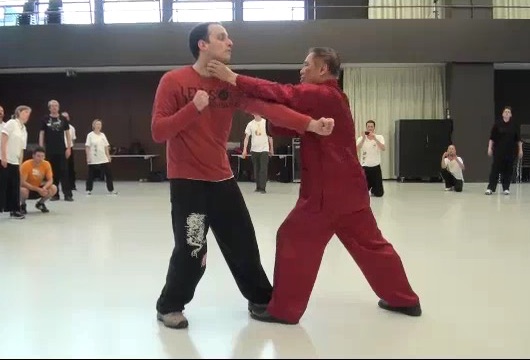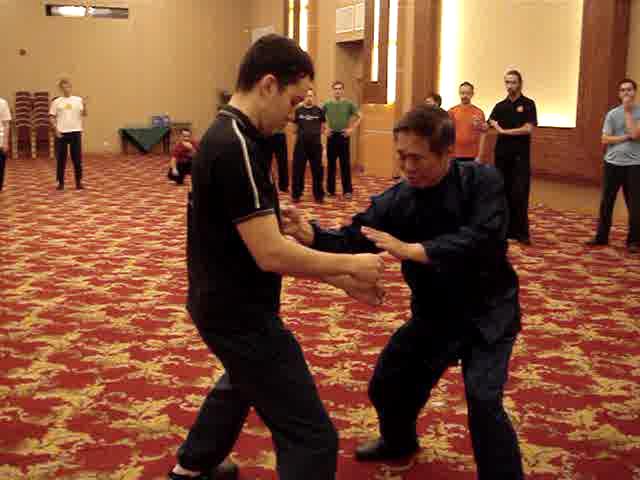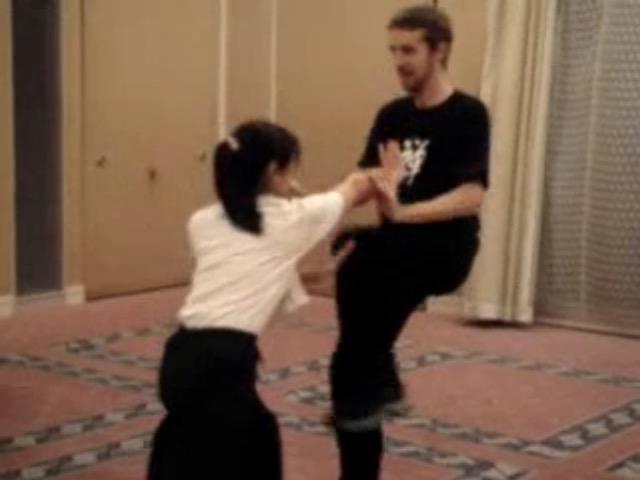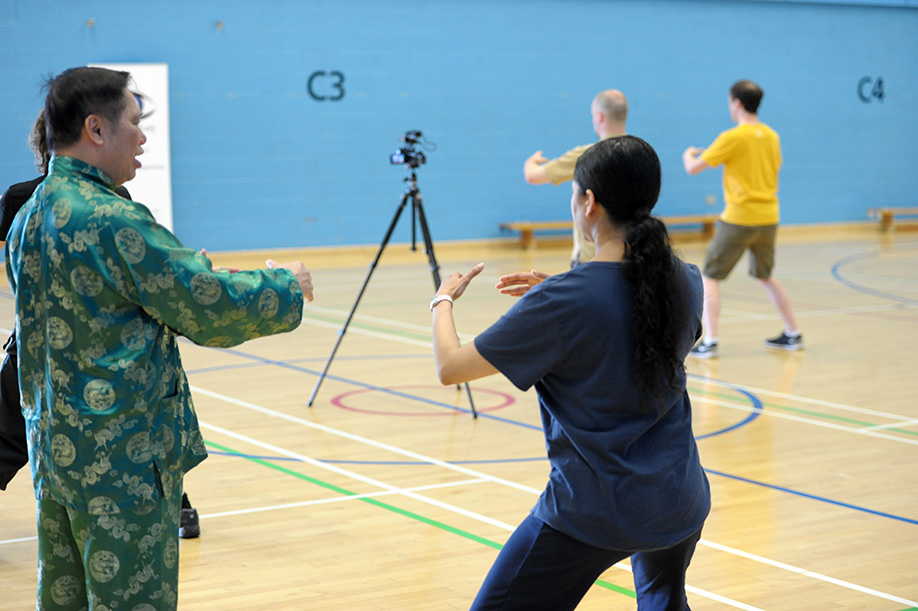SELECTION OF QUESTIONS AND ANSWERS
MARCH 2017 PART 3

Being mindful is very important in kungfu training
Question 1
I don't want to lose all desires and I want to be reborn again, if karma exists.
— Franz, Austria
Answer
You will certainly be reborn again unless you are perfectly Enlightened. If you want to be reborn at a higher station in your next life, start doing good and avoid doing evil.
Karma, or by whatever term it is called, definitely exists in our phenomenal dimension. In simple English, it is cause and effect.
If you practice meditation that separates your mind from your body, you will eventually be able to separate your mind from your body. If you don't, then other causes and effects have come into play.
If you practice chi kung that will overcome your sickness and confusion, you will eventually overcome your sickness and confusion. If you don't, then other causes and effects have come into play.
Editorial Note: Franz' other questions can be found in the March 2017 Part 2 and April 2017 Part 1 issues of the Question-Answer Series.
Question 2
Is there a way to continue training without gaining insight?
Answer
Yes, there is a way. In fact, it is the way used by most chi kung and kungfu practitioners outside our school.
This way is to train blindly, often not realizing that you have adverse effects instead of benefits. Many martial artists, for example, submit themselves to be punched and kicked at in their training. They have no insight.
We in Shaolin Wahnam train with insight, which includes amongst other things that we know what we are doing and why we do it. Even when a student had no insight when he first learned from us, he develops insight after some time.
We are generous not only in our teaching but also in allowing students to make their own choice. You can choose to be smarter than your teachers, and stop all your training. It is your choice.

We gain much insight in genuine kungfu training
Question 3
Would you advice me whether it is safe not to gain insight in our practice or to use the skills learned in meditation to be aware of every action I do.
Answer
You are confused over insight and skill on one hand, and their application on the other.
There are different levels of insight and of skill. Your levels of insight and skill are lower than those of your sifu on the topic you learn from him (otherwise he would not be your sifu), although your levels may be higher than most other people's.
Let us take practicing chi kung as an example. Having learnt in our school, you will have the insight that practicing chi kung will give your good health, and also have the skill to generate an energy flow. But your sifu's insight of having good health from chi kung practice is higher than your insight. Your sifu's skill of generating an energy flow is also higher than your skill.
But your insight of practicing chi kung giving you good health is higher than that of most other chi kung practitioners. Most other chi kung practitioners are still unhealthy, even if they know theoretically that practicing chi kung should give them good health. Your skill of generating en energy flow is higher than that of most other practitioners. Most other practitioners, including so-called masters, could not generate an energy flow despite practicing chi kung for many years.
On the other hand, the application of insight is different from the insight itself. Similarly the application of skill is also different from the skill itself. You have the insight that practicing chi kung will give you good health, but you are still unhealthy. It shows that you have not applied the insight successfully.
You have the skill of generating an energy flow, but you still have mental blockage. It shows that you have not applied energy flow successfully.
I would not advise you not to use the insight and skills you have gained.
I would also not advise you to use the insight and skills wrongly or inappropriately. I would advise you to use the insight and skills appropriately according to your needs at present.
I would also not advise you to apply the insight and skills you have gained in vispassana meditation in the way you described in your e-mail. These meditation methods may be excellent for other people, like monks ready for perfect enlightenment, but they are not appropriate for you.
Let us take an analogy. Suppose you want to marry a European girl of about 25 years old. Now you meet an African woman of 40 years old. Do you marry her, presuming that she will agree if you propose? No, she does not suit you needs.
This does not mean that she may not make a good wife for other people, but she is not an appropriate wife for you. Let other people who want to marry an African woman of about 40, propose to her.
Question 4
Would you advice me, or would you not advice me whether it is safe not gaining further insight or using the skills learned in meditation, like mindfulness in daily activities, for example knowing that I want to move my hand and then move it without separating the knowing mind from the body, knowing that I am angry or happy at a moment without separating observing mind from emotions.
Answer
You have become a slave to your insight and skills instead of being a master of them. Your insight and skills are to serve you, not you serve your insight and skills.
Forget about your knowing mind and your separate body. Just live your life beautifully and meaningfully.

In genuine kungfu it is not just gut and strength
Question 5
Should I use this method when it wanders away during chi kung and kungfu, in particular Zhan Zhuang?
Answer
This is an example of you trying to be smarter than your sifu and me, irrespective of whether you mean it.
Tacitly you implied that your sifu and I were fools, that we did not know separating the mind from the body would produce better results in our training, but you knew.
This is a main reason why you are still sick even when you have the rare opportunity to learn from us. You try to be smarter than us. You think, wrongly, that by adding other methods from elsewhere, you can have better results.
We have specifically asked students not to add anything we have not taught them. They can perform less, but not more.
In fact, we have become so cost-effective that now I advise students to attain only 30% of what they could attain, otherwise they may over-train.
You are a big fool, doing exactly what we warn you not to do, though you think you are smart.
Editorial Note: Franz wrote immediately to Grandmaster Wong to apologize for his unintentional mistake.
Question 6
How can people achieve super powers and become healthier without getting insight or is it a thing which always comes together?
Answer
Super powers, good health and insight are different things. They do not always come together.
A person with super power may not have good health and insight. A person with good health may not have super power and insight. A person with insight may not have super power and good health.

Abdominal breathing is naturally developed in Tree-Circle Stance
Question 7
My sifu told me that kungfu was only the third factor in combat. The other two more important factors are being brave and having strength. Is it true?
— Michel, France
Answer
Yes, it is true in today's world where kungfu combat is at a low level at its best, or non-existent for most practitioners. If a kungfu practitioner is brave and has strength, he can readily beat other kungfu practitioners or any people even when they have trained martial arts longer than him.
If you observe any free sparring today, you can hardly see any kungfu or martial art techniques. You see two persons generously exchanging blows and kicks. If one is brave and goes in brutally with strength, not minding being hit, he would readily defeat his opponent.
There is a colloquial saying in Chinese (Cantonese) as follows: "yiat tam, yi lek, sam kungfu", which means "one, gall bladder; two, strength; three, kungfu". "Gall bladder" here means "bravery". In Chinese medical philosophy, when one's gall bladder is full of chi, he will intrinsically be brave.
However, in genuine kungfu training, this saying may not be true. There is a kungfu saying that "strength is inferior to techniques; techniques are inferior to force; force is inferior to speed; and speed is inferior to the marvelous."
If you have strength, you can be defeated by someone who employed kungfu techniques. If you have good kungfu techniques, you can be defeated by someone with internal force. If you have internal force, you can be defeated by someone who is faster. If you are fast, you can be defeated by someone who uses kungfu marvellously.
What about bravery? Even when you can use kungfu marvellously, but in a fight if you lack the minimum bravery to use your kungfu, you will be defeated. Indeed, some kungfu practitioners become so paranoid when faced with a combat situation, that all their kungfu vanishes from them at that moment.
This is not uncommon for those who only practice kungfu forms. If they practice genuine kungfu, which includes combat application, they will intrinsically be brave, as expressed in the saying, "ngai ko yen tam tai", which means "as a person becomes skilful in his kungfu, he automatically becomes brave".
Question 8
I realized, I am naturally doing reverse breathing during stances and other exercises, specially the stances that involve Horse Riding Stance, Tree Circle Stance, Golden Bridge and Lifting Water.
I remember in the past when I started with stances my breathing was naturally more focused in the abdominal area. The belly used to go in when exhaling and out when inhaling, like we do in Abdominal Breathing. Now, naturally I am doing the other way around, like we do in Reverse Breathing.
I tried to come back to abdominal breathing again, but it feels uncomfortable and forced. When I naturally do reverse breathing I feel more relaxed, focused, in deeper chi kung state of mind, and I also feel I develop a lot more force.
Sifu, is it correct to do reverse breathing in stances, sets, etc? Or should I avoid it? Is it harmful? What should I do? Am I doing something wrong?
— Vero, Uruguay
Answer
What you do is correct. You can choose to use reverse breathing or abdominal breathing in stances, sets and other aspects of kungfu training or in daily life.
You need not avoid reverse breathing. Not only it is not harmful, it is beneficial. Just carry on and enjoy your training. Not only you are not doing anything wrong, you have progressed in your training.
Most people do not know abdominal breathing or reverse breathing. These important breathing modes need to be trained.
Most adults use chest breathing, which is different from reverse breathing. Most elderly people use throat breathing, i.e. they breath from their throat, which results in their becoming easily short of breadth.
Abdominal breathing is actually natural. Hence children use abdominal breathing naturally. They do not need to learn it like adults do. If you let a child lie down, you can easily see that his abdominal rises when he breathes in, and falls when he breathes out. However as children grow to become adults, they lose their natural ability of abdominal breathing, and revert to chest breathing. Hence they have to train or relearn abdominal breathing.
It is useful to note that abdominal breathing is different from diaphragm breathing. Many people, including some modern masters who often equate abdominal breathing with diaphragm, are unaware of this fact. In diaphragm breathing, air goes into the lungs as the diaphragm is pushed down to enlarge the lung capacity. In abdominal breathing, energy not air goes into the abdomen. As energy is not substantial, the rise of the abdomen in abdominal breathing is not noticeable, whereas it is in diaphragm breathing.
Similarly, reverse breathing is not the same as chest breathing, athough many people wrongly think they are the same because in both cases the chest rises when breathing in. In chest breathing, it is air that is breathed in, whereas in reverse breathing it is energy, and this energy is eventually sunk into the abdomen when breathing out.
As the dan tian, or energy bank, is located at the abdomen, we normally use abdominal breathing. But when we wish to have a lot of energy for vigorous activities, we use reverse breathing.
Both Abdominal Breathing and Reverse Breathing are special skills that need to be trained. But a skillful practitioner may spontaneously develop reverse breathing if he (or she) employes abdominal breathing long enough, as in your case. Please note that Abdominal Breathing and Reverse Breathing are spelled here with capitals "A" and "R" when we refer to the special techniques and skills to train the general processes of abdominal breathing and reverse breathing.
Although you may not have learned the special techniques and skills of Reverse Breathing, your abdominal breathing naturally progress to reverse breathing. This will give you more energy for whatever purposes you practice your stances and other exercises. Congratulation. When you first learned stances, we used abdominal breathing so as to store the energy at the dan tian to develop internal force and mental clarity.
Would you have internal force and mental clarity when you employ reverse breathing? Of course, you have. You already have developed internal force and mental clairy. Now you can utilize them more effectively.
If you have any questions, please e-mail them to Grandmaster Wong via his Secretary at stating your name, country and e-mail address.
LINKS
Selected Reading
- Don't Become a Slave to Intellectualization
- Chiu Kung: the Art of Developing Vital Energy
- My Sifu
- 48-Pattern Taijiquan Set
- South to the Old Smoky
